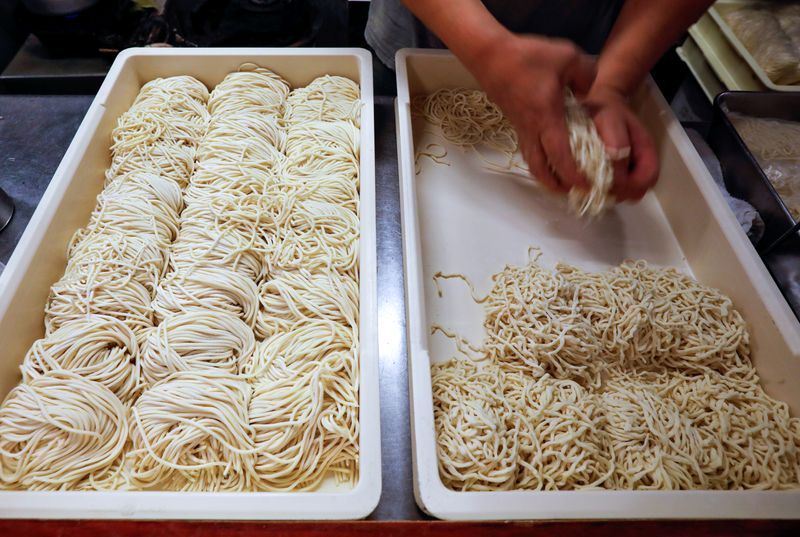By Daniel Leussink
TOKYO (Reuters) - Sixty-year-old Yashiro Haga is folding his Tokyo noodle ramen shop after 15 years in December, unable to overcome the prospect of a lasting customer slump due to the coronavirus crisis.
"The flow of people has changed due to the coronavirus," Haga said, standing behind the counter of his ground-floor shop, Shirohachi. "Customers aren't coming in and queuing up outside shops any longer."
The pandemic is damaging Japan's "mom-and-pop" restaurants - including noodle shops like Haga's - at a growing rate, despite evidence the government's massive effort to stave off bankruptcies is working in other sectors of the economy.
Hurt by deflationary pressures and growing competition in the run-up to the now-delayed Tokyo Olympics, noodle bars are particularly prone to the economic malaise the pandemic triggered in the service sector.
Small and mid-sized businesses like Haga's noodle bar employ about 70% of Japan's workers and account for 99.7% of the total number of enterprises, according to government data, leading some to worry that a COVID-19 resurgence could trigger an increasing number of layoffs among small firms.
While overall bankruptcies among firms with at least 10 million yen ($96,228) in liabilities in the six months to October fell 5.2% from a year earlier, those among restaurants rose 4.5%, data from private credit company Teikoku Databank showed.
Bankruptcies among restaurants with less than 10 million yen in liabilities were up by 137% for the same period, Tokyo Shoko Research, a firm that monitors similar data, said, while the total for the service-sector, including restaurants, rose 64.4%.
But industry insiders expect that is just the tip of the iceberg, as local shops often close up with no official filing.
"Many ramen shops won't appear in any figures when they're closing down because they're small, privately owned businesses," said Haga, who has gone without salary since April.
Hiroaki Nakazawa, a 42-year-old pharmacist who has frequented Shirohachi for about a decade, said he felt sad about its closure. "There's only one place like this."
At least seven other noodle stalls in the central Tokyo area popular with tourists where Haga has his table-less shop, which seats nine people at the counter, have already closed since March this year.
Nationwide, 34 ramen businesses with at least 10 million yen in liabilities went bankrupt during the first nine months of 2020, also a record high for the period, Teikoku Databank said.
Graphic: Japan's ramen shop bankruptcies are rising, https://graphics.reuters.com/HEALTH-CORONAVIRUS/JAPAN-BANKRUPTCY/ygdvzbbkwvw/chart.png
LACK OF FUNDS
Another reason why experts say statistics underestimate the true impact of the pandemic on ramen shops is that winding down is expensive due to requirements from landlords to leave the stores stripped down after a six-month notice period.
"There are many firms with a lack of cash flow," said Manabu Shintani, CEO of Actpro Co, a property intermediation services provider.
Among noodle shops, the first to fold this year were those whose businesses were already on knife-edge before COVID-19, often run by elderly owners, said Takeshi Yamamoto, an independent ramen critic who tracks shop closures.
Those were followed by a wave of noodle chains closing outlets, and now some places with younger owners are shutting down, said Yamamoto, who has eaten at more than 10,000 noodle shops.
He estimated that the real number of ramen shops shutting down nationwide was about 290 in October and November alone.
The spate of closures has helped some. Actpro's platform for matching businesses looking to shut down with firms hoping to move into the location being vacated has been a hit.
Once a match is made, a restaurant owner and the incoming owner negotiate with the landlord, cutting costs.
The company has seen the matchings quadruple to about 70 to 80 a month after the crisis started taking its toll, Shintani said.
Shirohachi's Haga used about $29,000 in government subsidies to get through until his closure.
He tried offering his noodles through takeout but was unable to make up for the income he lost after office workers' visits fell due to work-from-home restrictions.
"Even among the most popular places, sales from takeout aren't exceeding" the sales drop from the crisis, ramen critic Yamamoto said.
